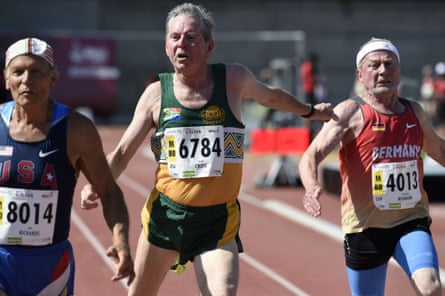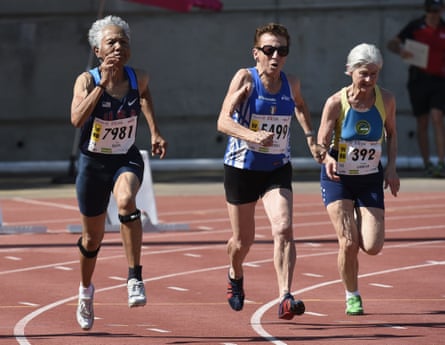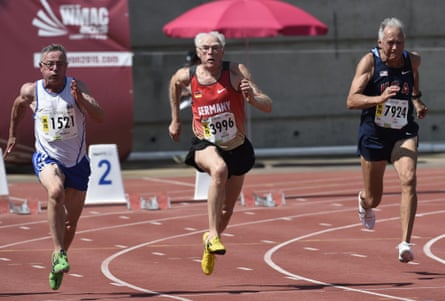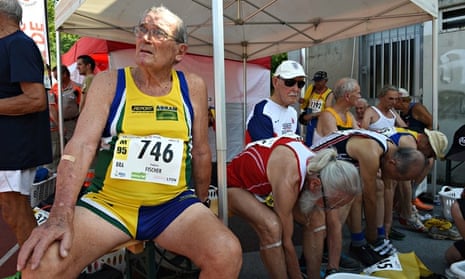The Brazilian athlete Frederico Fischer is introduced to a cheering crowd, to the tune of a samba. He and his competitors walk to the start line, nerves jangling, all focused determinedly on the race ahead. The gun sounds; seconds later, it is over. Fischer, the oldest athlete in the field, is beaten by a younger rival, Charles Eugster. This is the men’s 100m dash, for 90-to-99-year-olds. Fischer is 98, Eugster 96.
Every athlete, from Olympian to Sunday-morning plodder, knows that at some point peak fitness will start to dwindle, and the aches and pains will begin to outweigh the gains. Many take it as a sign to hang up their spikes. For some, however, that moment never comes. Sure, the odds of major medals lengthen and dreams of personal bests fade, but it is always possible to just keep going. The masters attaking place this week in Lyon, France, date back to 1975. Women over 35 and men over 40 are considered “veterans” and are thus eligible to compete against others within five-year age bands. The competition is fierce. Among many disproving the axiom that age slows you down is Eugster, the nonagenarian British dentist, who won the 200m this week in 55.53 seconds.

In longer distances too, athletes are showing age is no barrier to impressivhletics scene offers that chance.
The World Masters Championships, taking place this week in Lyon, France date back to 1975. Women over 35 and men over 40 are considered “veterans” and are thus eligible to compete against others within five-year age bands. The competition is fierce. Among many disproving the axiom that age slows you down is Eugster, the nonagenarian British dentist, who won the 200m this week in 55.53 seconds.
In longer distances too, athletes are showing age is no barrier to impressive times. In 2004, the Canadian Ed Whitlock, 73, broke the three-hour mark for the marathon – an achievement many much younger club athletes would kill for. He trained by running around his local cemetery for two or three hours nearly every day. Another Canadian, Olga Kotelko, who died last year at 96, held more than 30 world records for the 90-95 age category.

Of course, some veteran athletes are still competing at the highest level: Jo Pavey won European 10,000m gold in Zurich just before her 41st birthday. “I think the appeal is partly about having goals,” she says. “There is always something to aim for and it never ends, because you can just go into the next age category. I find it really inspirational to see somebody still sprinting in their 90s. They’re providing information for all of us about the ability of the human body, and what can be achieved if you don’t just rest on your laurels and think, ‘That’s it then.’”
But while some athletes may have a lifetime of training in them, it’s never too late to discover the talent lurking within. One man with a claim to being one of the greatest veteran athletes is Martin Rees. The 62-year-old Welshman only started running at the age of 38 and now holds more than 40 records for distances ranging from 5k to half-marathon.


Comments (…)
Sign in or create your Guardian account to join the discussion